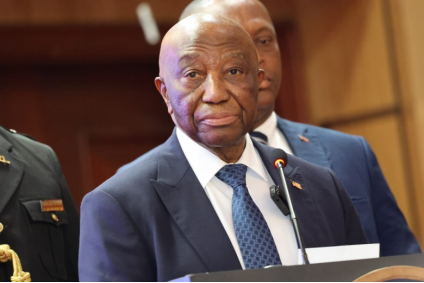The 2025 Liberian Flag Day celebration served as a stark illustration of the nation’s leadership crisis, raising concerns about the moral values and examples being set for the next generation. The event, meant to be a patriotic display of unity and national pride, was marred by the conspicuous absence of nearly the entire government, leaving schoolchildren who had braved heavy rain to participate feeling abandoned and undervalued. This disregard for a significant national event not only undermined the symbolic importance of the flag but also sent a troubling message about the commitment of Liberia’s leaders to their responsibilities and to the future of the country. The incident underscores a growing trend of apathy and disunity within the government, threatening to erode the foundations of Liberian democracy and instill a distorted understanding of leadership among its youth.
The blatant boycott of the Flag Day celebration by President Boakai, Vice President Koung, legislative leaders, and most of the cabinet, with the exception of a few compelled representatives, highlighted the deep fissures within the government. This absence was not merely a logistical oversight but a deliberate act, likely stemming from ongoing political tensions and power struggles. While disagreements and differing viewpoints are inherent in any democratic system, the complete disregard for a national event of such symbolic importance demonstrates a disturbing lack of respect for the very principles upon which the nation is built. The empty seats at the ceremony spoke volumes about the priorities of Liberia’s leaders, suggesting that personal and political agendas take precedence over national unity and the well-being of the citizens they are sworn to serve.
The impact of this leadership vacuum extends far beyond a single event. The children who dutifully participated in the Flag Day activities, representing the future of Liberia, witnessed firsthand the disunity and apathy of their leaders. This experience undoubtedly shaped their understanding of leadership, potentially normalizing the very behaviors that undermine effective governance and responsible citizenship. The message conveyed was that national symbols and ceremonies are merely hollow gestures, and that commitment to public service is optional. Such a distorted perception of leadership can have long-lasting consequences, eroding public trust in institutions and fostering a culture of cynicism and disengagement.
The lack of accountability and the absence of any explanation for the boycott further exacerbated the situation. Without acknowledging the gravity of their actions or offering any justification, the leaders effectively condoned this behavior, implicitly suggesting that such disregard for national events is acceptable. This lack of transparency and accountability perpetuates a culture of impunity, where those in positions of power are not held responsible for their actions. This not only undermines democratic principles but also sets a dangerous precedent for future generations, who may come to believe that leadership entails privilege without responsibility.
Furthermore, the government’s actions sent a confusing and disrespectful message to the international community, particularly the members of the Diplomatic Corps who attended the event. By boycotting the celebration, Liberia’s leaders demonstrated a lack of regard for international protocol and diplomatic relations. This behavior not only damages the country’s reputation on the global stage but also undermines its ability to forge strong partnerships and attract foreign investment, which are essential for its development and progress. The incident reinforces the perception of Liberia as a nation struggling with internal divisions and lacking a clear direction, potentially deterring international cooperation and hindering the country’s efforts to address its pressing challenges.
The 2025 Flag Day celebration should have been a moment of national unity and reflection, a time to reaffirm the values and principles represented by the Liberian flag. Instead, it became a symbol of the country’s leadership crisis, exposing the deep divisions within the government and highlighting the urgent need for a renewed commitment to responsible governance and ethical leadership. The absence of the nation’s leaders sent a powerful, albeit negative, message to the youth of Liberia, potentially shaping their understanding of leadership in ways that could have long-lasting and detrimental consequences for the future of the nation. The incident serves as a stark reminder that true leadership requires more than just holding a position of power; it demands dedication, integrity, and a genuine commitment to serving the people and upholding the values of the nation.














